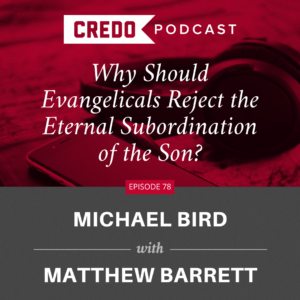
New Credo Podcast: Why Should Evangelicals Reject the Eternal Subordination of the Son?
 The trinitarian view known as Eternal Functional Subordinationism (EFS) has become a popular position over the last several decades. In this view, the Trinity is defined as a type of society, a society of roles and relationships. What kind of society? A society of hierarchy. One of the central claims of EFS is the Son’s functional subordination, or submission, to the Father and within the immanent Trinity. Some go so far as to give ultimate supremacy to the Father over the Son and Spirit. It has even been suggested that ultimate glory belongs to the Father alone. Now EFSers even use Nicene categories, like eternal generation, to justify this type of hierarchy within the immanent, eternal life of God.
The trinitarian view known as Eternal Functional Subordinationism (EFS) has become a popular position over the last several decades. In this view, the Trinity is defined as a type of society, a society of roles and relationships. What kind of society? A society of hierarchy. One of the central claims of EFS is the Son’s functional subordination, or submission, to the Father and within the immanent Trinity. Some go so far as to give ultimate supremacy to the Father over the Son and Spirit. It has even been suggested that ultimate glory belongs to the Father alone. Now EFSers even use Nicene categories, like eternal generation, to justify this type of hierarchy within the immanent, eternal life of God.
In this podcast, Michael Bird and Matthew Barrett discuss the problematic theological method that leads to EFS conclusions. Instead of a narrow biblicism, Bird and Barrett suggest reading the Bible with the Church through a trinitarian lens. As Bird states, “The Trinity is not a proof text, it is a hermeneutic. It is what you need to make sense of Scripture.” But this leads to further questions. For example, how should the scriptures be read if we reject the hermenuetic principles of EFS – what Bird calls the “sausage maker” method? How can we avoid presenting our social agenda as the “imago trinitatis”? Barrett and Bird discuss these topics along with Nana’s poisonous mushrooms, the Wizard of Oz, and the differences between Rahner’s rule and Augustine’s rules.
For further critique of EFS, consult chapter 8 of Barrett’s book, Simply Trinity: The Unmanipulated Father, Son, and Spirit (Baker, 2021).

